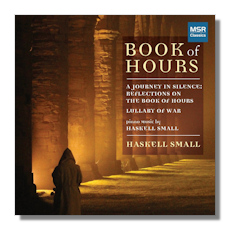
The Internet's Premier Classical Music Source
Related Links
- Small Reviews
- Latest Reviews
- More Reviews
-
By Composer
-
Collections
DVD & Blu-ray
Books
Concert Reviews
Articles/Interviews
Software
Audio
Search Amazon
Recommended Links
Site News
 CD Review
CD Review
Haskell Small

Book of Hours
- A Journey in Silence: Reflections on the Book of Hours
- 1. Introduction
- 2. Vigils
- 3. Lauds
- 4. Prime
- 5. Terce
- 6. Walk to Calvary
- 7. Sext
- 8. None
- 9. Vespers
- 10. Compline
- 11. The Great Silence
- Lullaby of War
- 1. War is Kind (text by Stephen Crane)
- 2. No (Text by Joy Harjo)
- 3. Recitative (text by Yvan Goll)
- 4. Naming Souls (text by Uri Zvi Greenberg)
- 5. Look Down, Fair Moon (text by Walt Whitman)
- 6. Guernica Pantoum (Paula Tatarunis)
- 7. Prayer (text by Stephen Crane)
Haskell Small, piano
Robin Weigert & Martin Rayner, narrators
MSR Classics MS1601 64:41
This is my first encounter with the music of American composer Haskell Small. He is also a fine pianist who serves as the featured artist on this CD which contains two well crafted, rather serious new compositions by him, one of religious inspiration and the other a commentary of sorts on war. The album notes mention Small's "extensive work" with Federico Mompou, the iconic Catalan composer, echoes of whose style can be heard in this music. In a way, Small's style here also vaguely suggests Olivier Messiaen, a composer who also wrote music with religious connections. At times, especially in the more militant and energetic passages in Lullaby of War, you hear hints of Prokofiev and Bartok as well. I make these comparisons to give you an idea of Small's style, not to suggest that he imitates these composers in any significant way. It may be said that he is more his own man than the product of a school or of an already established style, and further, he seems more cosmopolitan than American in his musical language.
I mentioned Messiaen, but I would say that Small's music is actually a bit more approachable, especially when compared with a more complex work of similar inspiration like Messiaen's Vingt regards sur l'Engant Jesus. In Small's A Journey in Silence: Reflections on the Book of Hours (2015) the music is mostly serene and often ponderous, with much activity in the piano's upper register. Yet, even when the composer is conveying a sense of silence and tranquility – often that's the case – much is happening. There are many dark and mysterious moments (in Nos. 2 & 4, for example), but a glorious rather plainspoken theme and one or two seemingly simple fragments that run through the various pieces always seem to offer hope and resolution, ultimately peace. As you listen again and again to these eleven pieces, their many profundities grow on you, and that is a little surprising because the writing is often transparent and relatively easy in execution. There are certainly no extra notes here, and if the work's textures initially strike you as bare bones, you soon realize there's actually a lot of meat on the music's skeleton. This is a fine work, but one that some listeners may find a little taxing in its ponderous character and generally slow music.
There is certainly greater variety and energy in Lullaby of War (2007). This work features two narrators reading poems by various authors pertaining to the horrors and destruction of war. Again, this is an extremely effective composition, especially upon first and even second hearing. But the problem is, on repeated hearings the narration loses its freshness while the music remains vital and powerful in its depictions of violence, loss and heartbreak. For some reason, the human mind can tolerate repeated performances of music better than repeated readings of poetry or other literary forms. Maybe you disagree.
Musical compositions with narration, from works like Berlioz's Lélio to Prokofiev's Peter and the Wolf and Copland's A Lincoln Portrait, can test one's patience as the spoken parts seem to become interruptions at times. Having said this, I can't say it's a mistake to include the narration in Lullaby of War because it certainly plays a powerful role in this work's effectiveness: the music, in fact, might actually sound fragmentary in places without it. In a sense, it's a kind of damned if you do and damned if you don't situation. The poetry selections are very good, especially Stephen Crane's War is Kind and, despite its brevity, Walt Whitman's Look Down, Fair Moon. In fact, all of the poetry here is much better than storytelling or straight prose types of narration. But still, once you know what the work is about, the spoken word becomes less impactful and, to me, somewhat intrusive.
The work as a piece of art is still quite valid and powerful. The opening number, War is Kind, is haunting and emotionally potent, as is #6, Guernica Pantoum. The other five sections, some very short, are all quite compelling. In both works on this MSR Classics disc, Small plays with authority and seemingly with total commitment. Indeed, you're getting the music as the composer wants you to hear it. The readings by Robin Weigert and Martin Rayner are delivered subtly and with powerful dramatic effect. The sound reproduction is vivid and the album notes informative. Full texts are provided. Recommended, despite what some might regard as my nitpicking reservations.
Copyright © 2016, Robert Cummings


















